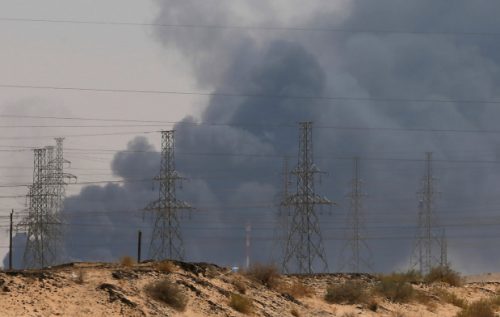Iran dismissed accusations by the United States that it was behind attacks on Saudi oil plants that risk disrupting global energy supplies and warned on Sunday that U.S. bases and aircraft carriers in the region were in range of its missiles.
Yemen’s Houthi group claimed responsibility for Saturday’s attacks that knocked out more than half of Saudi oil output or more than 5% of global supply, but U.S. Secretary of State Mike Pompeo said the assault was the work of Iran, a Houthi ally.
The drone strikes on plants in the heartland of Saudi Arabia’s oil industry, including the world’s biggest petroleum processing facility, were expected to send oil prices up $5-10 per barrel on Monday as tensions rise in the Middle East.
Iranian foreign ministry spokesman Abbas Mousavi, speaking on state TV, dismissed the U.S. allegation as “pointless.” A senior Revolutionary Guards commander warned that the Islamic Republic was ready for “full-fledged” war.
“Everybody should know that all American bases and their aircraft carriers in a distance of up to 2,000 kilometers around Iran are within the range of our missiles,” the semi-official Tasnim news agency quoted commander Amirali Hajizadeh as saying.
State oil giant Saudi Aramco said the attack cut output by 5.7 million barrels per day, at a time when Aramco is trying to ready itself for what is expected to be the world’s largest share sale.
Aramco gave no timeline for output resumption but said early on Sunday it would give a progress update in around 48 hours. A source close to the matter told Reuters the return to full oil capacity could take “weeks, not days.”
Traders and analysts said crude may spike to as high as $100 if Riyadh fails to quickly bring back supply.
The kingdom, the world’s top oil exporter, ships more than 7 million barrels of oil to global destinations every day. Aramco told one Indian refinery that it would deliver crude from other sources and had adequate inventory, a refinery source said.
Riyadh said it would compensate for the loss by drawing on its stocks which stood at 188 million barrels in June, according to official data. The United States said it was also ready to tap emergency oil reserves if needed.
The Saudi bourse closed down 1.1% with banking and petrochemical shares taking the biggest hit. Saudi petrochemical firms announced a significant reduction in feedstock supplies.
“Abqaiq is the nerve center of the Saudi energy system. Even if exports resume in the next 24-48 hours, the image of invulnerability has been altered,” Helima Croft, global head of commodity strategy at RBC Capital Markets, said.
Source: Reuters
